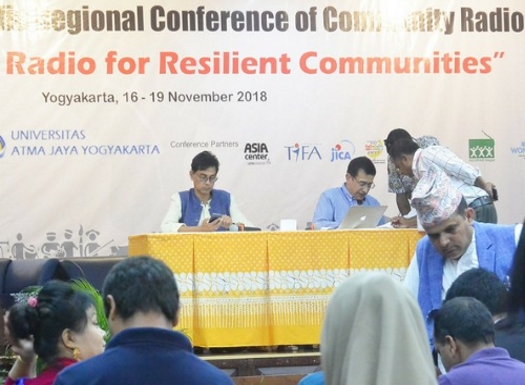Asia-Pacific members of the World Association of Community Radio Broadcasters (AMARC) from 11 nations upheld a collective commitment to support establishing community radios in conflict areas as a means of peace building and reconciliation, as they concluded the at the 4th AMARC Asia Pacific Regional Conference of Community Radios in Yogyakarta, Indonesia.
AMARC is the international umbrella organization of community radio broadcasters founded in 1983, with nearly 3,000 members in 110 countries. Its mission is to support and contribute to the development of community and participatory radio along the principles of solidarity and international cooperation.
The theme for this year’s event was “Community Radio for Resilient Communities” and was attended by community radio broadcasters and media practitioners from Australia, Bangladesh, Cambodia, India, Indonesia, Japan, Myanmar, Nepal, the Philippines, Thailand and East Timor.
At the end of the event, the participants also agreed “to create spaces on the airwaves for indigenous peoples, refugees, displaced people, the stateless, the trafficked and diverse and marginalised voices.”
Sinam M. Sutarno, chairman of the Indonesian Community Radio Network said: “Our current challenge is religion-based identity politics and we must counter it with moderate (religious) interpretations, and adopt a humanist, local cultural approach that calls for acceptance of differences.”
Charlie Saceda, emergency media and communication coordinator of PECOJON, a Philippine-based peace journalism network, said media outlets in the Philippines often grappled with misinformation as more and more people fall prey to fake news on social media.
“In the Philippines we have free Facebook but it is only limited to seeing posts. So, it’s hard to verify fake news because you have to pay to access the links,” he said.
“If your community radio is very powerful, it can reach other communities. Community radios can remind people not to react to fake news right away and instead find out what really happened.”
Meanwhile, in Japan, community radio stations invited their listeners to send messages of encouragement to victims of bullying, many of whom are migrants, said Kim Chiaki from FM YY in Kobe, Japan.
“This culture of bullying is very difficult to eliminate, so we choose to encourage those who are bullied so that they can rise up and so that people can accept differences,” Kim said.
Budi Hermanto, an activist on the Indonesian Community Radio Network (JRKI), said that radicalism had only emerged recently as a topic among community radio broadcasters.
“Before, community radio activists often talked about or campaigned for tolerance, but did not actually discuss radicalism,” he said.
In their statement, participants also said they would continue to develop programs to support disaster planning, mitigation, response and recovery.
They also committed to zero tolerance to violence against women in their radio stations, networks and communities, and to developing programming that addresses violence against minorities.

